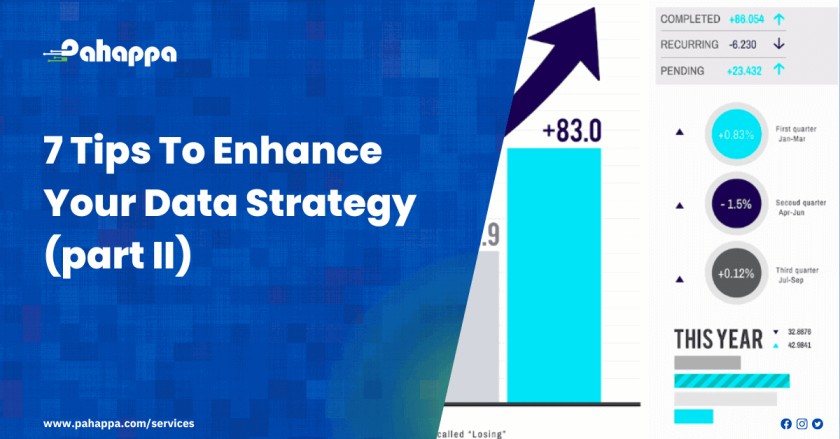In the previous article, we touched on 7 Tips To Enhance Your Data Strategy. In this piece, we shall explore six more practical takeaways for better data-based decision-making in a company.
1) Find trends and patterns
Finding important trends and patterns is one of the most integral parts of any successful data-based decision-making process. After you’ve established actionable goals and carried out some targeted testing, you can dive down further into contextualized data insights to uncover any informational trends or patterns that may be valuable.
For example, if you’ve established a KPI for tracking your customer service call resolution rates over the course of a month and you observe a pattern of resolution rates declining (dropping below your set target rate) towards the weekend, you can investigate the cause. Later in the week, you might discover that employee motivation levels are declining in the later days of the week. Based on that finding, you might implement tactics to increase engagement or motivate personnel.
2) Don’t be afraid to revisit and reevaluate
Our brains easily jump to conclusions and are reluctant to consider alternatives because we are particularly poor at reconsidering our initial judgments. For example often times one can easily get stuck near the end of a job/project because you don’t want to change your course once you have selected and committed to a direction.
You can break out of your default decision-making behaviors by double-checking data and making sure you’re recording the proper metrics. You can recognize biases by relying on team members to give their perspectives. But don’t be reluctant to take a step back and reconsider your choices. While at first, it might seem like a setback, it’s a vital step in the right direction. Instead of waiting and seeing what occurs, figuring out where we might have gone wrong and fixing it immediately will yield better results. It is commonly known that waiting to see what happens has a cost.
3) Present the data in a meaningful way
Digging and extracting knowledge is good, but being able to share and communicate your findings is better. You need to make sure that your insights are made use of and not just left to collect dust. You don’t need to be an IT whiz to create and design a robust web dashboard that will tell your data story and help you, your team, and your management makes the best data-driven business decisions with the aid of outstanding reporting tools. For instance, you must always keep your finances under control. A financial dashboard guarantees an at-a-glance overview of a company’s financial performance. This dashboard focuses on real-time data and offers the major KPIs, including operating expenses ratio, net profit margin, income statement, and earnings before interest and taxes.
4) Set measurable goals for decision making
Once you have your question, your data, and your insights, the difficult part—decision-making—comes next. Even if the data are conflicting, you must still use your findings to inform your business decisions while also making sure that they are in line with the company’s mission and vision. To be certain that you are on the correct track, set measurable goals. Also, put data to use by taking action!
5) Invest in the right data-based decision-making tools
In order to realize your goals and make consistently informed decisions, working with the right tools is crucial to get the most out of your business analytics for data-driven decisions.
Working with the appropriate tools makes data accessible to anyone. Everyone in the company benefits by having access to a centralized dashboard that provides a wealth of easily digestible data-driven insight, leading to steady growth, innovation, and profitability. With the help of these self-service analytics tools, everybody working for the company will be able to interact with data without any prior technical knowledge. When everyone can use data to their benefit, your organization will invariably succeed.
Everyone in your organization will be able to communicate successfully and deliver their best work thanks to our cutting-edge reporting tools.
6) Continue to evolve your data-driven business decisions
It is important to remember to always review, evaluate, and examine the choices you make based on the evidence. Because of our hyperconnected digital world, we now have greater access to data than ever before. Make data-driven education one of your company’s core values and foster a culture where everyone is responsible for testing, researching, and adapting their business decisions in response to the environment they operate in.
To truly benefit from this plethora of insights, it’s crucial to continuously update and modify your business goals based on the ever-evolving preferences of your clients, partners, and customers if you want.
Want to start making data-driven business decisions? Give us a call today for a free consultancy!











